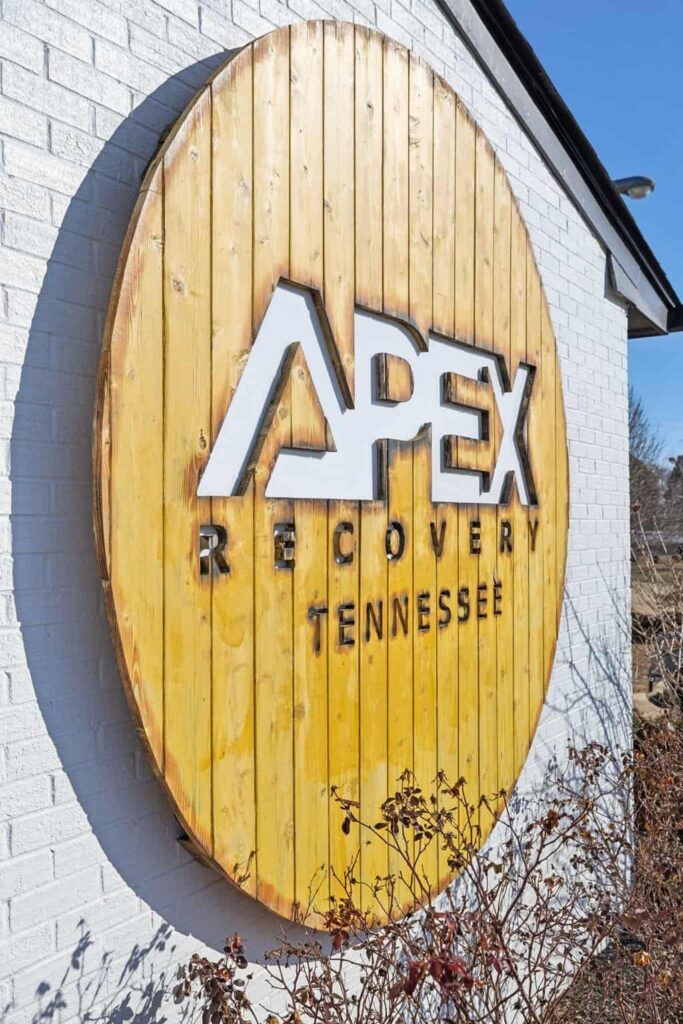










We Accept Most Major Health Insurance
Apex Recovery Tennessee is dedicated to helping those impacted by Post-Traumatic Stress Disorder (PTSD). We specialize in evidence-based PTSD treatment, allowing you to receive the highest standard of mental health care. As a licensed and accredited behavioral treatment facility, we accept health insurance from most major providers and can assist by checking your insurance coverage levels. Our locations are easily accessible for residents of Nashville, Memphis, Knoxville, Clarksville, Murfreesboro, and beyond, serving people from across Tennessee and neighboring states.
Post-traumatic stress disorder can feel overwhelming, but you don’t have to face it alone. Get in touch with Apex Recovery Tennessee to learn more about our PTSD treatment programs and how we can help you access support through your insurance plan. Call us today at (615) 703 4639 – our qualified team is here to provide guidance and answer any questions you may have about your path to recovery. Mental health challenges are nothing to be ashamed of, and seeking help shows strength, resilience, and hope.
Check Your Insurance
with Apex Recovery
At Apex Recovery, we work with most major insurance providers to make PTSD treatment accessible. Our qualified team can assist you in verifying your coverage levels for addiction or mental health treatment, making sure you understand what is covered and any associated costs. We strive to provide clarity and support throughout the process and your journey to PTSD treatment.

What is Private Health Insurance Coverage?
Private health insurance coverage is a type of health insurance provided by private companies. It helps you access important medical and behavioral health services by offsetting the costs of care. Coverage typically includes doctor visits, hospital stays, preventative care, and various specialized treatments based on your plan and provider.
Many private health insurance plans also include mental health coverage, such as treatments for Post-Traumatic Stress Disorder (PTSD). However, the extent of this coverage often depends on your specific plan and provider. Determining your coverage can involve understanding key factors like deductibles, co-pays, and whether the provider is in-network, making it necessary to verify your benefits beforehand.
Check Your Health Insurance Coverage
"*" indicates required fields
Does Insurance Cover Assessments for Post-Traumatic Stress Disorder?
Yes, insurance does typically cover assessments for Post-Traumatic Stress Disorder (PTSD) as part of a treatment admissions process. However, the extent of coverage can vary based on your insurance provider and the specifics of your plan. Factors such as whether the provider is in-network, your deductible, and co-pay requirements may impact what portion of the assessment is covered.
At Apex Recovery Center in Tennessee, we understand the importance of taking the first step toward recovery. That’s why we offer free and confidential PTSD assessments as part of our mental health treatment admissions process. Call us today at (615) 703 4639, so you can explore your options and receive guidance without any added financial burden.
Does Health Insurance Cover Inpatient PTSD Treatment in Tennessee?
Yes, health insurance does frequently include coverage for inpatient PTSD treatment. The specifics of what is covered depend on your insurance provider, the type of plan, and factors such as whether the behavioral treatment center is in-network. Understanding your benefits in detail can help you prepare for any potential out-of-pocket expenses.
Inpatient residential rehab for post-traumatic stress disorder offers a structured setting where you can focus entirely on recovery. Inpatient rehab programs in Tennessee provide detailed care, including therapeutic support, medication management, and a safe environment to begin healing. This level of mental health treatment is designed to address the complex challenges associated with PTSD in a supportive and focused manner.
Does Health Insurance Cover Outpatient PTSD Treatment in Tennessee?
Yes, health insurance does typically provide coverage for outpatient PTSD treatment, though the extent of this support is influenced by your specific insurance plan and provider. Factors such as deductibles, co-pays, and network status of the treatment center can all play a role in determining your uncovered expenses.
Outpatient treatment options, including Intensive Outpatient Programs (IOP) and Partial Hospitalization Programs (PHP), offer flexibility while maintaining a structured approach to care. Such programs allow people to continue daily responsibilities, such as work or school, while receiving targeted therapy and support, making them an excellent choice for many on their recovery journey.
Private PTSD Treatment Centers in Tennessee That Accept Insurance
Finding effective PTSD treatment centers that accept insurance is vital for long-term recovery. With many options across Tennessee, Apex Recovery offers private addiction and behavioral health treatment facilities designed to work with your insurance provider to ease the process. Below are our locations available to assist you:
- Apex Recovery Brentwood: 209 Ward Cir, Brentwood, TN 37027
- Apex Recovery Columbia: 2710 Trotwood Ave STE A & B, Columbia, TN 38401
How to Find Post-Traumatic Stress Disorder Recovery Centers Near Me That Take Insurance
Looking for a PTSD rehab center that takes insurance can feel overwhelming, but using the right strategies makes it manageable. Start by researching rehab for post-traumatic stress disorder treatment centers in your area, including Apex Recovery’s trusted behavioral facilities, and follow these practical steps:
- Use Local Search Terms to Find PTSD Rehab Centers Near You: Search phrases like “PTSD rehab centers that take insurance near Columbia” or “PTSD treatment centers that accept insurance in Nashville” can help you find relevant mental health rehab facilities. Local search terms can guide you to options like Apex Recovery, which accepts insurance.
- Visit the Facility’s Website to Check Insurance Information: Many mental health rehab centers list accepted insurance plans on their sites. For example, Apex Recovery Brentwood and Columbia provide detailed insurance information. Nashville and Brentwood residents can easily explore coverage options through these websites to confirm compatibility.
- Call the PTSD Rehab Facility to Discuss Your Needs: Speaking directly to staff allows for clarity on what’s covered by insurance. Dial (615) 703 4639 to contact Apex Recovery and discuss your insurance plan, allowing you to address questions about rehab for PTSD coverage with confidence and ease.
- Check for Accreditation Like Joint Commission Certification: Accredited mental health facilities assure quality care standards. Verifying this accreditation confirms that the rehab center follows proven behavioral health treatment protocols. Apex Recovery’s certification highlights its commitment to providing high-standard, insured PTSD treatment.
By following these steps, you can identify reliable mental health facilities like Apex Recovery in Columbia and Brentwood that accept your insurance to support your recovery.
Free PTSD Assessment
Does Health Insurance Cover Therapy and Counseling for PTSD?
Yes, health insurance does commonly cover therapy and counseling for PTSD, but coverage levels depend on your insurance provider and specific plan. Many medical insurance plans offer benefits for mental health coverage, though out-of-pocket expenses like co-pays or deductibles may apply. It’s important to verify with your insurance provider to understand your options.
Coverage often includes various mental health therapy methods, such as group therapy, individual therapy, cognitive behavioral therapy (CBT), and dialectical behavior therapy (DBT). Evidence-based approaches, commonly found in behavioral facilities like Apex Recovery, can support PTSD recovery while being partially or fully covered by your insurance plan.
Does Insurance Cover EMDR Therapy for PTSD?
Yes, insurance can often cover eye movement desensitization and reprocessing (EMDR) therapy for PTSD. However, the extent of coverage depends on your insurance provider and the details of your plan. Some policies may fully cover EMDR, while others may require co-pays or partial payments. Contacting your insurer can help clarify your benefits.
Apex Recovery can work with you to develop a program that aligns with your coverage and post-traumatic stress disorder treatment needs. With locations in Brentwood and Columbia, our qualified team is experienced in accommodating various insurance plans, making sure your care is both effective and accessible. Call us at (615) 703 4639 for further information on available options.
Does Health Insurance Cover Post-Traumatic Stress Disorder Medication?
Yes, health insurance may cover medications prescribed for post-traumatic stress disorder (PTSD). However, the extent of coverage will differ depending on your provider and plan details. While some policies typically cover the full cost, others may include co-pays or deductibles that patients must address.
Common medications such as selective serotonin reuptake inhibitors (SSRIs) or serotonin-norepinephrine reuptake inhibitors (SNRIs)—like sertraline or venlafaxine—are often included in coverage. Such medication must be prescribed by a qualified healthcare provider and align with your PTSD treatment plan. Confirm specifics with your insurer to fully understand your options.
Does Insurance Cover Retreats for Post-Traumatic Stress Disorder?
Yes, Insurance typically covers retreats designed for post-traumatic stress disorder (PTSD) treatment, but the extent of coverage varies based on your insurance provider and plan specifics. Some policies might offer full or partial coverage, while others may require additional costs. Verifying details with your insurer can provide additional clarity.
At Apex Mental Health Recovery, we begin with a detailed assessment to identify your unique needs and goals. Our experienced team works to craft personalized treatment plans, making sure that the methods align with your insurance coverage and therapeutic requirements. To explore options designed to support your recovery, contact us today.
Common PTSD Treatment Programs in Tennessee Covered by Health Insurance
Managing PTSD often requires tailored, professional care to address the personal challenges faced by individuals. Fortunately, health insurance typically covers various evidence-based treatment programs across Tennessee. PTSD programs range from intensive therapy sessions to medication management and are designed to support recovery and improve quality of life. Below are some options available for treatment.
Intensive Outpatient Programs (IOPs) for Executive Function and Emotional Regulation Support
Intensive Outpatient Programs (IOP) provide structured therapy sessions several times a week while allowing people to maintain their daily routines. IOPs focus on helping patients develop important coping strategies, manage stressors, and be able to achieve emotional regulation without requiring overnight stays.
For those experiencing PTSD, IOPs can specifically address difficulties in executive functioning and the ability to regulate emotions. Therapies within this framework often target triggers, working to reduce the intensity of reactions while promoting healthier responses in real-life settings.
Outpatient Therapy for Focus, Impulsivity, and Time Management Issues
Outpatient therapy involves scheduled therapy sessions that usually occur once or twice a week and serve as a flexible option for people seeking mental health treatment. Sessions may include talk therapy or other evidence-based approaches guided by licensed mental health professionals.
For PTSD patients, outpatient therapy can aim on addressing challenges like impaired focus, impulsive behaviors, and difficulties managing time. Outpatient therapy sessions help patients regain control over their daily lives, offering consistent support while allowing gradual improvement.
Partial Hospitalization Programs (PHPs) for Severe or Complex Attention Disorders
Partial Hospitalization Programs (PHP) provide intensive, structured care during the day, often five days a week, without requiring overnight stays. PHPs offer a range of therapies, including individual and group sessions, as well as medical monitoring.
For people with PTSD in the Volunteer State, PHPs can be particularly beneficial in managing severe or complex symptoms, such as intense concentration difficulties that interfere with daily functioning. This level of care helps bridge gaps between inpatient treatment and outpatient therapy for optimal support.
Residential (Inpatient) Treatment for Attention Disorders and Co-Occurring Conditions
Residential or inpatient treatment involves staying at a treatment facility full-time, where patients receive comprehensive care in a controlled environment. This type of program includes various therapies and activities tailored to the needs of each individual.
For PTSD, inpatient care provides a focused environment to treat the disorder along with any co-occurring mental health conditions. By removing external stressors, residential programs allow for deeper healing and more intensive therapy options.
Medication Management Through Covered Mental Health Services
Medication management involves the supervision and adjustment of prescriptions to assure effectiveness and minimize side effects. It is often conducted by psychiatrists or other healthcare providers specializing in psychotropic medications.
For people suffering from PTSD in Tennessee, medication such as antidepressants or anti-anxiety drugs can complement therapy. Regular evaluations help determine the best pharmacological approach, making sure medication treatments align with the unique needs of the individual while addressing their symptoms effectively.
Cognitive Behavioral Therapy (CBT) for Long-Term Focus and Behavioral Improvement
Cognitive Behavioral Therapy (CBT) is a widely recognized, evidence-based approach aimed at identifying and changing negative thought patterns that influence behavior. Therapists guide patients through practical strategies to manage their symptoms more effectively.
For PTSD patients, CBT is particularly useful in addressing persistent thoughts or memories that disrupt daily life. This therapy promotes long-term improvement by helping people develop healthier thinking habits and behaviors, improving both focus and emotional stability.
Telehealth Services for Convenient Treatment Access Across Tennessee
Telehealth services allow people to access mental health care remotely through video sessions or phone calls with licensed professionals. This approach removes geographical limitations, making therapy more accessible and convenient.
For people managing PTSD in Tennessee, telehealth provides an opportunity to receive consistent support without the barriers of travel. It’s an excellent option for those in rural areas or seeking flexible scheduling while maintaining access to quality care.
Behavioral Coaching and Life Skills Development Included in Some Health Plans
Behavioral coaching focuses on teaching people techniques to improve habits, manage challenges, and enhance overall life skills. It often includes mentoring and goal-setting as part of the process.
For PTSD treatment in Tennessee, this approach equips people with tools to rebuild daily routines and regain a sense of personal control. It’s especially beneficial for reinforcing skills learned in therapy, providing a thorough recovery strategy tailored to personal needs.
Check Your Insurance Coverage
Health Insurance Providers That Cover PTSD Treatment in Tennessee
BlueCross BlueShield of Tennessee, Cigna Healthcare, and Aetna offer a variety of plans that typically include coverage for PTSD treatment. Private insurers often cover services such as therapy sessions, medication management, and outpatient programs. Eligibility and benefits depend on the specific plan, so checking with your provider for precise details is necessary.
UnitedHealthcare (UHC), Ambetter (from Celtic Insurance), and Oscar Health also provide plans that support PTSD treatments, including evidence-based therapies and other recovery programs. Many of their offerings accommodate mental health treatment options tailored to individual needs, promoting both accessibility and quality care for mental health conditions like PTSD.
Humana, Molina Healthcare, National General (an Allstate company), and Farm Bureau Health Plans extend a range of mental health coverages, including PTSD treatment. Such health insurers may cover therapies, inpatient services, or medication while allowing flexibility to address unique patient needs. Reviewing your policy’s mental health benefits can help clarify your specific coverage.
Common Types PTSD Covered by Health Insurance in Tennessee
Post-traumatic stress disorder (PTSD) can manifest in various forms, often varying based on the nature of the trauma experienced. Many health insurance plans in Tennessee provide coverage for behavioral health treatment programs designed to address these specific PTSD types. Below are some common categories and reasons professional care can facilitate recovery.
Single-Event Trauma PTSD from Accidents or Disasters
Single-event trauma PTSD arises from a specific, distressing incident such as a car accident, natural disaster, or life-threatening event. Symptoms often include flashbacks, heightened anxiety, and difficulty resuming daily activities due to the overwhelming impact of the event.
Professional treatment is vital for this type of post-traumatic stress disorder because it helps people process the traumatic event in a safe and structured environment. Therapies can reduce the intensity of symptoms and teach coping strategies, empowering patients to regain control over their lives.
Complex PTSD from Repeated or Ongoing Abuse or Neglect
Complex PTSD develops from prolonged exposure to traumatic experiences, such as repeated abuse, neglect, or sustained violence. This condition often includes symptoms like emotional numbness, trust issues, and a deep sense of insecurity.
Professional care is important in addressing the multifaceted impacts of complex PTSD. Rehab for PTSD treatment programs can provide a detailed approach, combining therapy and support systems to help people gradually rebuild emotional resilience and healthy relationships.
Combat and Violence-Induced PTSD Including Military and Assault
Combat and violence-induced PTSD is commonly associated with military service, active combat, or physical assault. Those affected may face intrusive memories, hyperarousal, or emotional detachment as a result of exposure to extreme violence.
Seeking professional treatment is especially important for this type of post-traumatic stress disorder. Tailored therapies can assist people in processing their experiences, managing triggers, and working toward reintegration into civilian life or rebuilding a sense of personal safety.
Dissociative PTSD with Depersonalization or Memory Gaps
Dissociative PTSD presents with symptoms like feelings of detachment from oneself (depersonalization) or lapses in memory related to traumatic events. This form of PTSD can severely disrupt a person’s sense of identity and reality.
Professional treatment significantly benefits people with dissociative post-traumatic stress disorder by providing targeted interventions such as trauma-focused therapies. Therapy approaches aim to reduce dissociation, improve memory integration, and help patients reconnect with their emotions and experiences.
Chronic Stress-Related PTSD from Long-Term Workplace or Domestic Trauma
Chronic stress-related PTSD arises from prolonged exposure to high-stress environments, such as toxic workplaces or abusive domestic situations. Symptoms might include persistent anxiety, physical health issues, or a breakdown in coping abilities.
Professional therapy is crucial for addressing this type of PTSD. Post-traumatic stress disorder treatment not only alleviates psychological distress but also provides strategies for identifying and eliminating toxic patterns, giving you a healthier and more stable environment for recovery.
How to Get Insurance to Pay for PTSD Treatment in Tennessee
An easy and stress-free way to understand your PTSD treatment coverage is to contact Apex Recovery. Our qualified team will review your insurance details, clarify coverage levels, and handle the entire process on your behalf, ensuring you can focus on your recovery without unnecessary stress or confusion.
Call Apex Recovery Tennessee today at (615) 703 4639 or complete our contact form to start the process. Our professionals are here to help you access the PTSD treatments you need, quickly and efficiently. Taking care of your mental health is just as important as looking after your physical health, and you don’t have to do it alone.
- Tennessee’s mental health services reported significant utilization of evidence-based PTSD treatments in 2023, showcasing the effectiveness of structured programs like private residential rehab.
- Communities near military bases, such as Clarksville, Tennessee, report higher numbers of veterans with PTSD, emphasizing the need for robust support networks.
- Studies indicate that 11-20% of veterans from Operation Iraqi Freedom and Operation Enduring Freedom experience PTSD each year, highlighting the importance of accessible behavioral health treatment.
- 5.2 million adults in the U.S. (3.6% of the population) experience PTSD annually, with higher rates among military personnel. This highlights the importance of accessible treatment options, including private residential rehab.
- Residential PTSD treatment programs in Tennessee, such as those at Apex Recovery, integrate therapies like Cognitive Behavioral Therapy (CBT) and holistic approaches, offering a structured environment for recovery.
